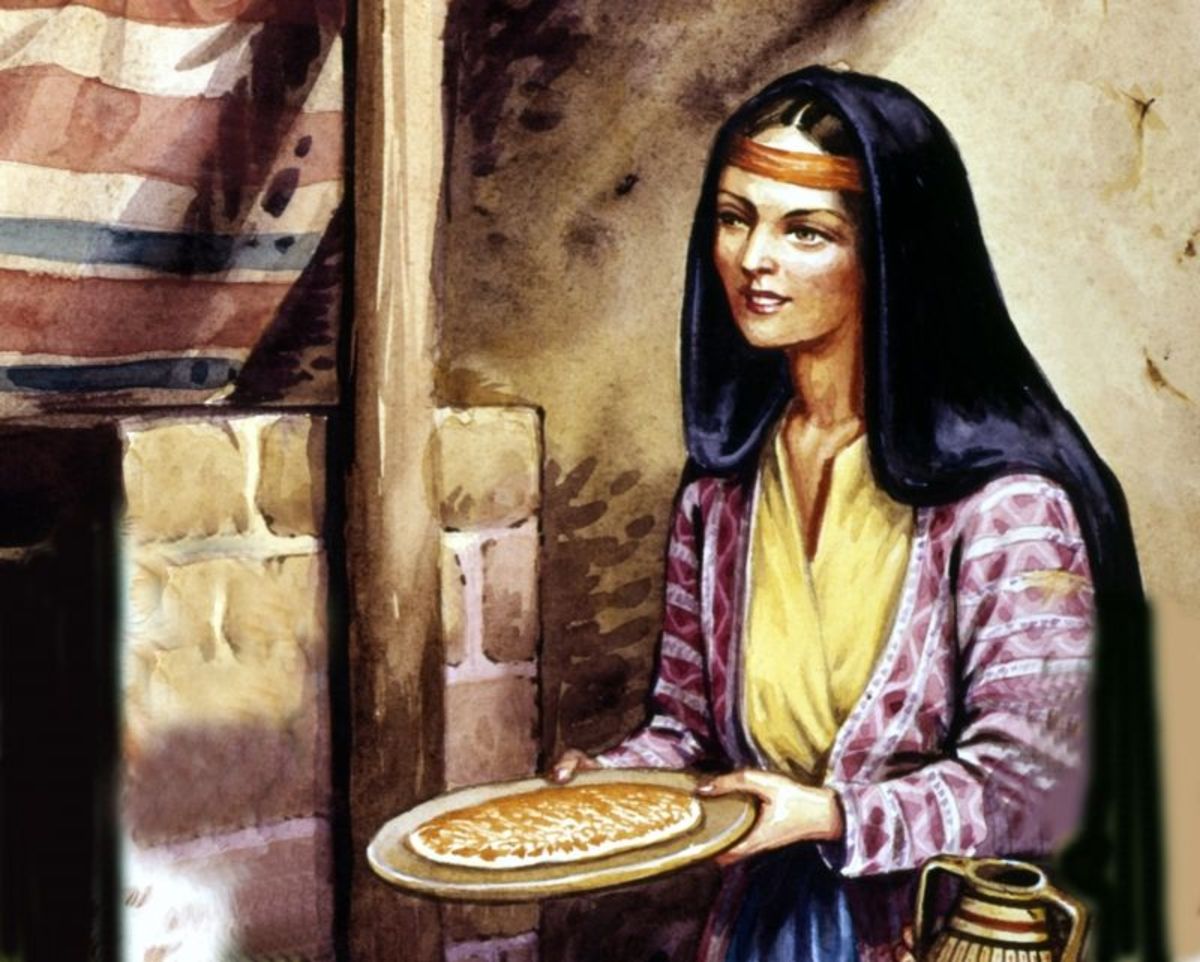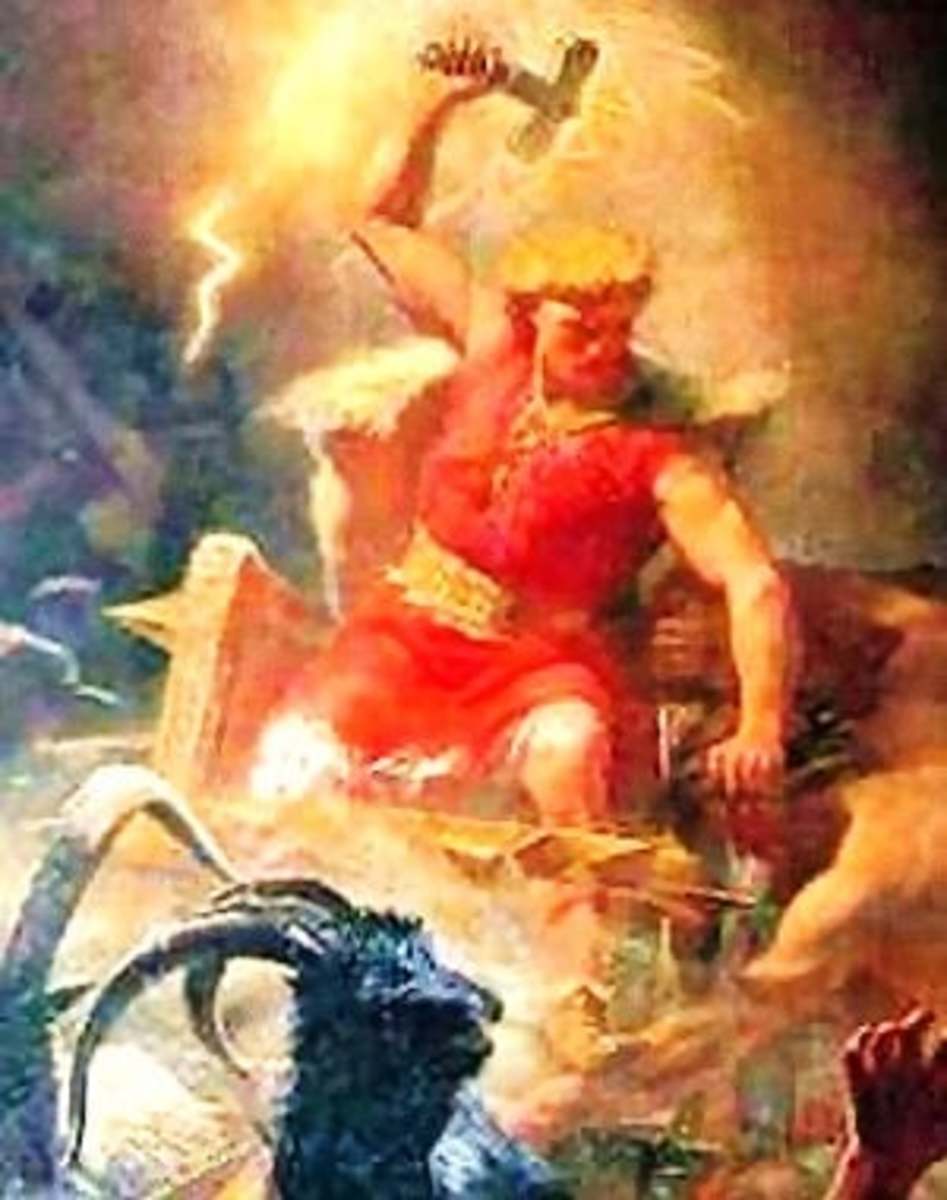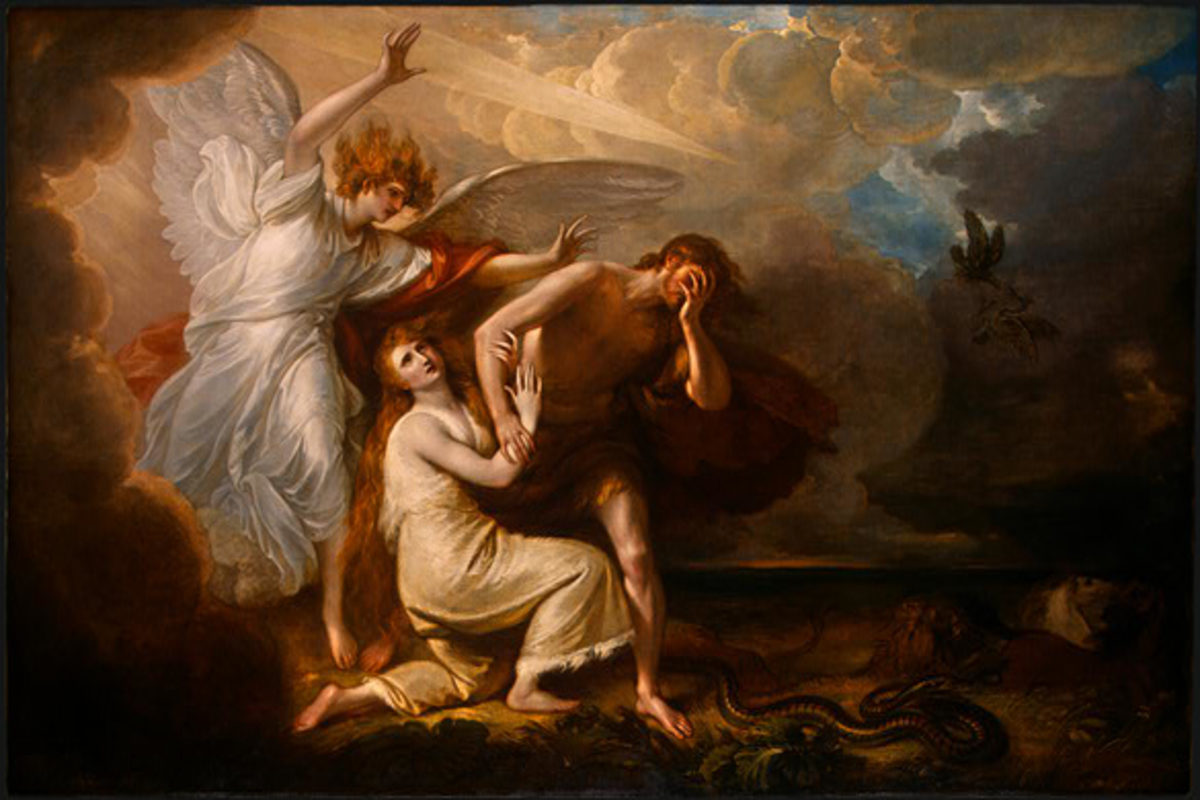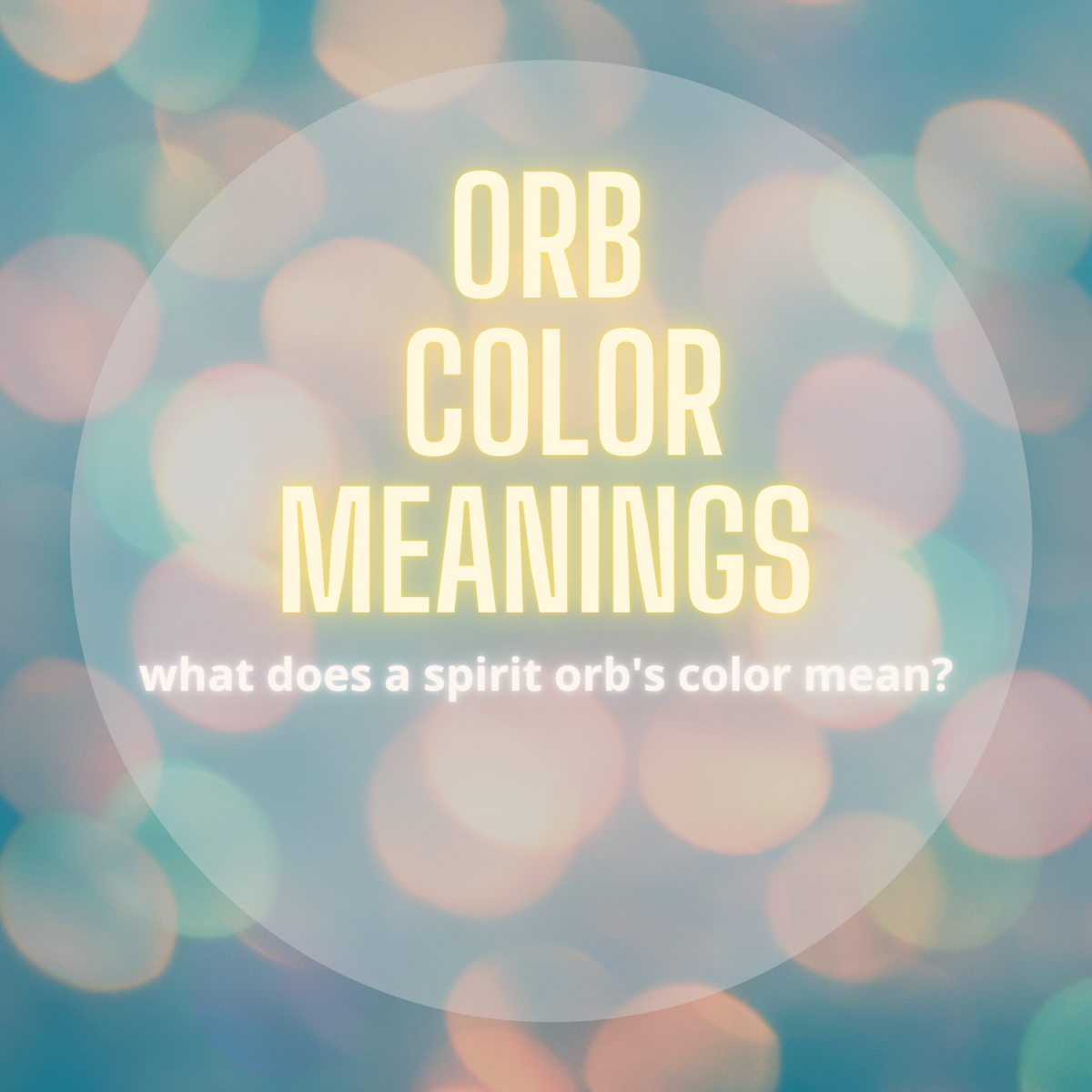Yahweh - the inconvenient truth: Part 3
Are Yahweh and Baal identical twins or one and the same?
As previous mentioned, Yahweh was a storm god. Throughout the Old Testament, the motif of thunder and lightning adorns the pages. Various scriptures include:
Exodus 20: 18-19
18All the people perceived the thunder and the lightning flashes and the sound of the trumpet and the mountain smoking; and when the people saw it, they trembled and stood at a distance. 19Then they said to Moses, "Speak to us yourself and we will listen; but let not God speak to us, or we will die."
I Samuel 2:10
They that strive with Yahweh shall be broken to pieces
Against them will he thunder in heaven
Psalm 18:13-14
13 The Lord also thundered in the heavens,
And the Most High uttered His voice,
Hailstones and coals of fire.
14 He sent out His arrows, and scattered them,
And lightning flashes in abundance, and routed them.
Psalm 18 and Psalm 29 clearly marry Yahweh with Baal:
Psalm 18
"The waves of death swirled about me, and torrents of destruction overwhelmed me. The cords of Sheol coiled around me; the snares of death confronted me. In my distress I called to Yahweh; I called out to my Elohim. From his temple he heard my voice; my cry came to his ears. The earth trembled and quaked, the foundations of the heavens shook; they trembled because he was angry. Smoke rose from his nostrils; consuming fire came from his mouth, burning coals blazed out of it. He parted the heavens and came down; dark clouds were under his feet. He mounted the cherubim and flew; he soared on the wings of the wind. He made darkness his canopy around him \ the dark rain clouds of the sky. Out of the brightness of his presence bolts of lightning blazed forth. Yahweh thundered from heaven, the voice of the Most High resounded. He shot arrows and scattered the enemies, bolts of lightning and routed them. The valleys of the sea were exposed and the foundations of the earth laid bare at the rebuke of Yahweh, at the blast of breath from his nostrils. He reached down from on high and took hold of me... He rescued me from my powerful enemy..."
Ps 29, also attributed to David:
"The voice of Yahweh is over the waters; the El of glory thunders, Yahweh thunders over the mighty waters." His voice is "powerful" and "majestic;" his voice is lightning, it "breaks to pieces the cedars of Lebanon." "The voice of Yahweh strikes with flashes of lightning" and "shakes the desert," "twists the oaks, and strips the forests bare... Yahweh sits enthroned over the flood."
Now in the Canaanite text we have:
Then Baal opened a slit in the clouds,
Baal sounded his holy voice,
Baal thundered from his lips. . .
the earth’s high places shook.
Baal’s enemies fled to the woods,
Hadad’s haters took to the mountains.
And Baal the Conqueror said:
“Hadad’s enemies, why are you quaking?
why are you quaking, assailers of the Valiant One?”
Baal’s eye guided his hand,
as he swung a cedar in his right hand.
So Baal was enthroned in his house.
“No other king or non-king
shall set his power over the earth.
I will send no tribute to Ers son Death,
no homage to El’s Darling, the Hero.
Let Death cry to himself,
let the Darling grumble in his heart;
for I alone will rule over the gods;
I alone will fatten gods and men;
I alone will satisfy earth’s masses.”
Another symbol of Baal is the cedar tree.
Why is this? Does this mean that some of the Psalms we read actually about Baal and not Yahweh? There is evidence to suggest that they were perceived as interchangeable.
Baal
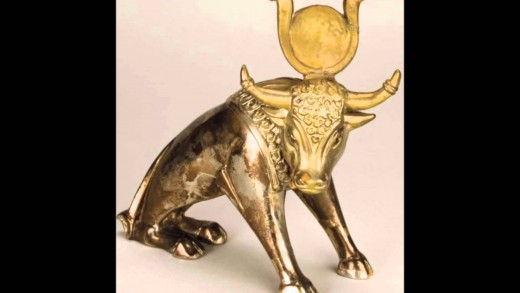
Baal
Not only was Baal a storm god like Yahweh, but was also depicted as a bull. His worship was established by the 18th Dynasty. He was a significant god to the Canaanites by 1400 BC and is mentioned in the Hebrew Bible as a nemesis of Yahweh.
Like Yahweh ( Exodus 15:3), Baal is also a god of war. He was depicted with a curved beard, donned a horned helmet and was armed with a word, a club made of cedar and a thunderbolt. Yahweh’s weapon is also a thunderbolt as indicated in Psalm 29.
Baal was depicted as a powerful warrior with a curved, Syrian-style, beard. He wore a horned helmet and carried various weapons, including a sword, a club made from a ceder tree, or a thunderbolt.
Baal means, “Lord, master, owner or husband.” For the Western Semites, Baal was known as the great weather god. However, the Bible uses the word Baal in a plural manner. Judge 2:11 says:
11 Then the Israelites did evil in the eyes of the Lord and served the Baals. The Baalim were made up of various local Baals.
Using the singular term for Baal with another term after it indicated other minor of local gods. Examples are Baal-Berith, Baal-Gad or, in the feminine form, BaalatBeer, for example.
So even though the Bible avoids using Baal as a title, it is clear that in pre-Israelite times, Baal was recognized as the weather god of Syria-Palestine. In 1988, in ancient Egyptian between Memphis and Thebes, there were 400 cuneiform tablets discovered. One of them was called the El-Marna letters. They refer to the events in the Middle East in the 15th and 14th centuries BC. References to the Hebrews lend credence to the veracity of Judges. Canaan is mentioned often. The name “Canaan” is even found in Egyptian inscriptions of the New Kingdom. The King of Babylon named the entire Egyptian province Canaan. He wrote to Pharoah: : "Canaan is thy land and its kings are thy servants" (El-Amarna 8, 25)
In the letters, Canaanite clients addressed the Egyptian kings as, “My Baal, my Addu.” Addu is another title for storm god, according to the second millennium west semetic material from Mari, a city on the Euphrates river.
Baal in disrepute
There were instances where Yahweh and Baal were interchangeable in the Bible. Previously, Baal occurred as an element in a number of compound proper names such as Jerubbaal, Ishbaal and Meribaal.
Gideon, the son of Joash the Abiezrite, was named Jerubbaal. When Israel was being invaded by the Midianites, an angel of Yahweh in Judges 6:11 instructed Gideon to destroy Baal’s altar that evening and the effigy of Asherah.
When the Baal worshippers found out that their shines were wrecked, they figured out that it must have been Gideon. They demanded of Joash that he had over his son to be executed but Joash cleverly countered that:
Judges 6
31 But Joash replied to the hostile crowd around him, “Are you going to plead Baal’s cause? Are you trying to save him? Whoever fights for him shall be put to death by morning! If Baal really is a god, he can defend himself when someone breaks down his altar.” 32 So because Gideon broke down Baal’s altar, they gave him the name Jerub-Baal[f] that day, saying, “Let Baal contend with him.”
An example of Bible redacting is from 2 Samuel: 11
Who killed Abimelek son of Jerub-Besheth? Didn't a woman drop an upper millstone on him from the wall, so that he died in Thebez? Why did you get so close to the wall?' If he asks you this, then say to him, 'Moreover, your servant Uriah the Hittite is dead.'"
Associating anyone with Baal was taboo whereby it wasn’t previously so the author of Samuel scrubbed out the element of Baal in in the compound name Jerubbaal and replaced it with Jerub-Besheth.
Baal and Yahweh interchangeable.
The Bible suggests that David saw Baal as one and the same:
2 Samuel 5:20
So David went to Baal Perazim, and there he defeated them. He said, "As waters break out, the LORD has broken out against my enemies before me." So that place was called Baal Perazim.
David did not name Baal Perazim after Yahweh. Therefore we can assume David believed they were one and the same. More evidence can be found in 1 Chronicles 12:4-6:
…4and Ishmaiah the Gibeonite, a mighty man among the thirty, and over the thirty. Then Jeremiah, Jahaziel, Johanan, Jozabad the Gederathite, 5Eluzai, Jerimoth, Bealiah, Shemariah, Shephatiah the Haruphite, 6Elkanah, Isshiah, Azarel, Joezer, Jashobeam, the Korahites,…
As you can see, Bealiah is one of David’s warriors. Bealiah, In fact, Baali, from the Strong’s Hebrew Lexicon, means:
1180 Ba`aliy bah-al-ee' from 1167 with pron. suff.; my master; Baali, a symbolical name for Jehovah:--Baali.
1180 is linked to 1167 which reads:
1167 ba`al bah'-al from 1166; a master; hence, a husband, or (figuratively) owner (often used with another noun in modifications of this latter sense):--+ archer, + babbler, + bird, captain, chief man, + confederate, + have to do, + dreamer, those to whom it is due, + furious, those that are given to it, great, + hairy, he that hath it, have, + horseman, husband, lord, man, + married, master, person, + sworn, they of.
1168 Ba`al bah'-al the same as 1167; Baal, a Phoenician deity:--Baal, (plural) Baalim.
Ishbaal was one of King Saul’s sons. He had compounded the names of his son with Baal as every other Israelite had done. Baal and Yahweh were the same. However, when Baal fell into disrepute, again Jewish redactors changed Ishabaal to Ishbosheth. Bosheth means, “Shameful thing”, referring to Baal.
The Samaria obstraca are writings from ancient Israel. It indicates that there was a tendency to name children after Baal prominent in the northern kingdom. Every two names in the lists compounded with the name Yahweh and one was formed with Baal.
To be continued...

